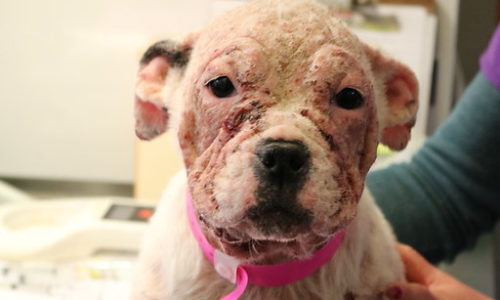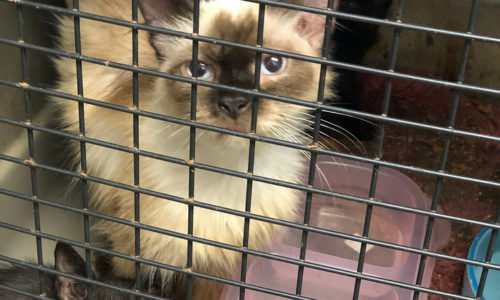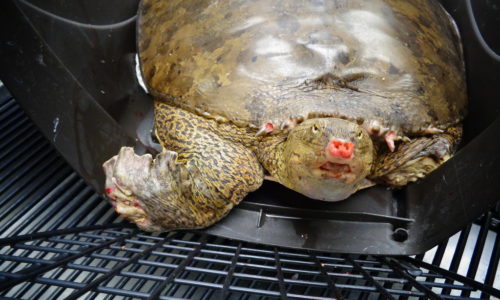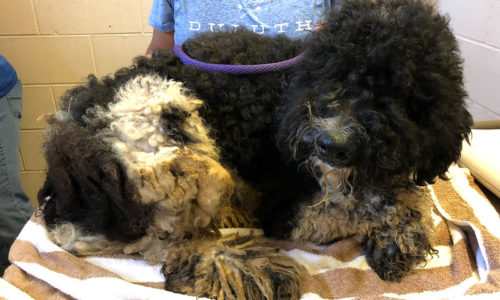How to File a Report
When making a report, collect as much information as you can, including:
- A description of any abuse that you may have witnessed, including the address, date, and time, as well as the name and description of the abuser, if known.
- Your name and phone number, so that you can be contacted by the investigator.
- Any other information that you see as helpful.
855-PETS-911
Be a hero. Call when you see animal abuse and neglect, and help us stop the suffering.

Signs of Cruelty, Neglect, or Abuse
What constitutes neglect or abuse? This can vary greatly, depending on the person asked; however, failure to provide adequate food, water, or shelter is neglect. The use of physical force to cause injury to an animal is abuse. And neglect or abuse constitutes cruelty to animals, which is illegal in Ohio.
What Can One Person Do?
One person can make a huge difference in the life of a neglected or abused animal. You are the eyes and ears in the community, and we rely on what you see to help protect the animals in the Miami Valley. Suspicion of abuse or neglect is enough to report it to the Humane Society of Greater Dayton. Here are some questions to ask if you’re considering filing a report:
- Is the animal not being fed or given water?
- Does the animal have appropriate shelter from the elements, and is shade available in hot summer months?
- Does the shelter for the animal provide it with adequate room to move?
- Is the animal’s coat dull or hair missing? Are its eyes dull, and does the animal appear listless, with no energy?
However hard it may be to see an animal in these conditions, it is important to leave the environment as it is, so that a complete investigation may be conducted. And never put yourself at risk. Any attempt to remove the animal yourself can cause both you and the animal harm. It is always best to work with the Humane Society of Greater Dayton to improve the situation.
Our Latest Success Stories
Adeona
Adeona was found as a stray puppy in very rough shape and brought to an open-intake shelter. Her condition was quite horrific when she arrived. She had mange and her poor skin was raw, cracked, swollen and irritated.
Darling
It was a hot summer day when our Humane Agent received a report about cats that were being kept in a storage facility in Dayton. Our officer quickly rushed to get a search warrant and opened up the storage unit to find nine cats being housed inside.
Luke & Ike
Weak. Malnourished. Two walking skeletons. That is how the Humane Society of Greater Dayton’s humane agent found Luke and Ike, two senior Percheron horses.
Ayesha
Left in the cold. Filthy, disgusting mud halfway up their legs. Shivering in single digit temperatures. Squealing for help. That is how our humane agent found seven pigs on cold January day, including one piglet we named Ayesha.
Isabelle
A concerned citizen reported an animal that looked very sick at a local market. When our humane agent walked through the doors, she found a 17-year-old Midland Softshell turtle at the facility. She was suffering and sick and needed immediate attention.
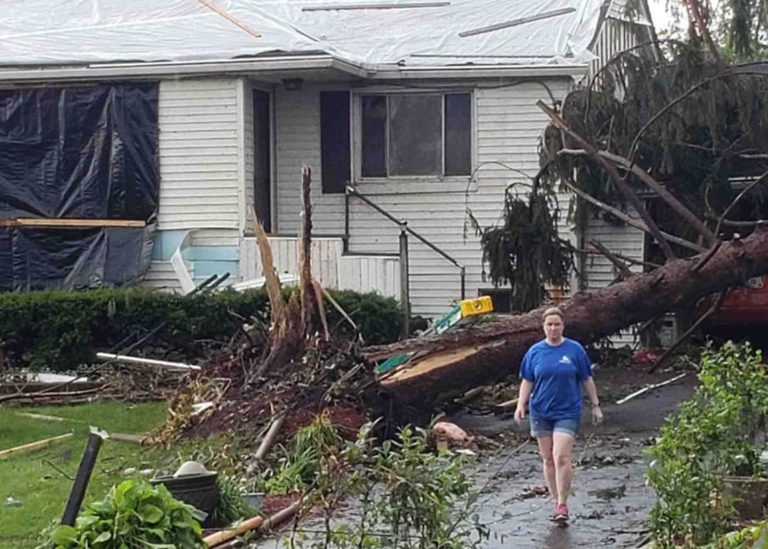
Disaster Preparedness
If recent tragedy has taught us anything, it is that we need to be prepared for whatever life throws our way. Whether it is a tornado, house fire, or a global pandemic, it is important to not just have a plan in place for your family but also for your pets. To keep your pets safe, we recommend using our PETS emergency plan as a guide. PETS stands for Prepare, Establish, Target, and Support.
Prepare Information
No one knows your pet better than you. If something were to happen to you, it is best to have a central place where all information regarding your pet is kept. Do they require a certain food? Do they take certain medications? What is your veterinarian’s contact information? Do you have your pet’s microchip number or license number? These are all important questions to have on hand regarding your pet, so if someone has to care for your pet for an extended period of time, they are set up for success. You should also include either a digital version on a flash drive or printouts of your pet’s veterinary and vaccination records, as well as a description and recent photos of your pet in case they are lost or get loose during the emergency.
Establish Emergency Kit
Emergency kits are something that will help keep your mind at ease but also help you grab items quickly if an emergency strikes your family. Besides food, water, a container to house your pet, and medication, we have a checklist for you to help you prepare your kit easily. Your kit should be placed near your emergency exit or in your home’s established safe zone so you can quickly access it when time is of the essence. You should also look through your emergency kit at least once a month to rotate out any food or medicines before they expire. Download Emergency Kit Checklist PDF.
Target Family and Friends
Having a safe haven outside of your immediate home for your pets is critical. You never know when an emergency will come, and establishing family, friends, or a boarding facility that can care for your animals is key. Create a list of potential caretakers and ask them if they would be willing to help temporarily care for your pet in case of an emergency. By speaking to them beforehand, you not only have peace of mind, but you also have a clear plan in place. It may be good to also have one or two fallbacks in case your initial caretaker is unavailable. List contact information and names for all your potential caretakers with your paperwork inside your emergency kit.
Support Efforts
Supporting your pets before an emergency happens can help make any sudden transition much easier. By being proactive, you are adding additional protections to you and your pet.
- Place an emergency sticker on your window, letting first responders know the type and number of animals in your home. Visit our main shelter to pick one up today.
- Make sure your pet is properly identified and microchipped. The Humane Society of Greater Dayton offers low-cost microchipping to the public. Simply stop in during regular office hours, and we can microchip your pet on the spot. No appointments are needed, but your peace of mind is priceless.
- Once every month or two, go through your emergency kit and keep it updated. Switch out foods, water, and medicines, update veterinary or vaccination records and personal information.
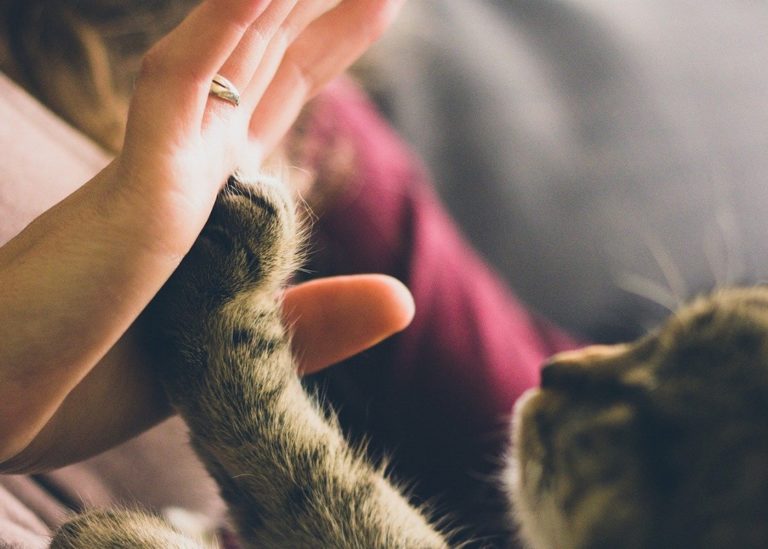
Safe Pet Shelter Program
At a moment’s notice, the Humane Society of Greater Dayton will provide temporary shelter for pets in a safe and secure location for families fleeing domestic violence situations.
If someone is in an abusive relationship and looking for a way to get out, we encourage them to contact a local advocacy center such as the Artemis Center or a domestic violence shelter such as YWCA Dayton. The Humane Society of Greater Dayton works directly with these organizations to arrange temporary housing for a pet while an individual or family works to relocate and safely move away from the abuse.
If you or someone you know are victims of domestic violence, we encourage you to contact one of our local advocacy groups’ hotlines. You can either call the Artemis Center’s 24/7 Domestic Violence Hotline at 937-461-HELP (4357) or the YWCA Dayton’s 24/7 onsite crisis hotline at 937-222-SAFE (7233). Both organizations can provide information regarding the Safe Pet Shelter Program as well. If you witness abuse toward an animal, contact the Humane Society of Greater Dayton at 855-PETS-911 or file a report online.

